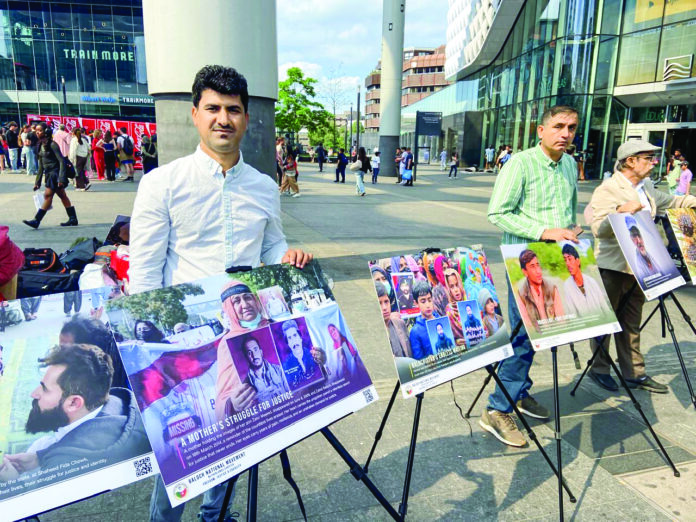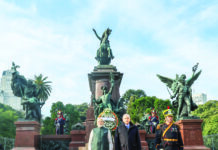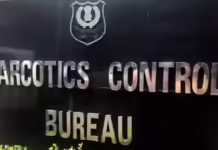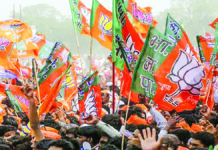
Amsterdam: Baloch organisations based in Britain and Europe have stepped up their campaign against Pakistani authorities and security forces whom they accuse of human rights violations, as part of their recent efforts to internationalise their struggle for independence.
In the last few months, many protest demonstrations have been held by the two main Baloch organisations representing the struggle abroad in the UK, Netherlands and Germany. Baloch National Movement, which is active in Europe and the Netherlands, held a demonstration on June 21 at Dam Square, Amsterdam, protesting alleged atrocities by Pakistani military and intelligence forces. On June 9, BNM held a protest demonstration in Germany.
Another demonstration was held by the Free Baloch Movement in The Hague on May 28 against the ill-effects of the nuclear tests Pakistan conducted in Balochistan in 1998 in front of the International Court of Justice.
This was preceded by BNM putting up a photo exhibition about the Baloch struggle near the University in the town of Utrecht in Holland.
At Dam Square, on the day Amsterdam celebrated the 750th year of its founding, Baloch activists, around 30-odd or so, raised slogans against Pakistani army, calling it a “terrorist army”; held placards documenting Baloch youth who have been allegedly disappeared; and demanded an end to what they called a “genocide”.
Their goal, they say, is freedom.
This has never been music to the ears of Pakistani authorities. The Baloch have demanded freedom from Pakistan, Iran and Afghanistan for over 70 years, claiming that they were forcibly merged with the newly formed Pakistani state; some of the land they claim lies in Iran and Afghanistan as well. The province, with naval and air bases, is treated by Pakistan the same way the British did, who ruled it before: as an imperial garrison. The region remains the least developed of all the Pakistani provinces, with low literacy rates and poverty. It is resource rich: oil, natural gas, gold abound. Some of it is already being extracted by Pakistan and multinational companies, with little coming to the Baloch in terms of benefits.
But Baloch leaders maintain that it is not just an economic issue. More jobs and material benefits cannot be a substitute for freedom, according to those who spoke to The Sunday Guardian from BNM and FBM.
Muhim Abdur Rahim Baloch, 45 years old, is the president of the Netherlands chapter of BNM. Establishing contact with BNM was difficult since they operate under the watch of the Inter-Services Intelligence abroad which has allegedly targeted Baloch activists in exile in the past; this has made them wary.
But at the demonstration, where we meet, he is keen to talk. He arrived two years ago to Holland after facing trouble due to political activism in Oman where he worked as a sports trainer for 22 years. “It is not a democratic country with social freedom. I worked as an underground party worker there; there was a threat to my life. Political activism is not allowed. My friends and other activists have been arrested and killed in the past.”
He pointed to a placard held by his daughter who is part of the protest, which features a smiling young man. A cricket player of 42 years of age, Adham Baloch was shot dead by security forces due to his political activism. “He was shot dead on the cricket ground, in front of his cousin. He was an underground worker. They called and warned him twice, thrice; then, they shot him dead.”
Internationalising the Baloch issue is important to BNM because it puts Pakistan under pressure.
“We want to strengthen the voice of Balochistan abroad. We have met Dutch Parliamentarians. We have held a demonstration at the International Court of Justice at the Hague. In various cities in Europe and Holland such as Geneva, Berlin, Zwolle, Arnheim, Maastricht and others, we have put up exhibitions,” he told The Sunday Guardian.
The BNM’s Holland chapter has 60 members and a few sympathisers. All over Europe they have 180 members. In Europe, they function out of the Netherlands, Germany and Britain. Their chairman, Naseem Baloch is based out of France and he organized the demonstration at Geneva. Their head of foreign affairs is based out of the UK.
While they seek to interest the western world in their struggle, from India, they want explicit support. “It is India’s responsibility to support us, logistically and morally.”
Asked about the armed struggle being waged by the likes of Baloch Liberation Army, and Baloch Liberation Front, who have targeted Pakistani security forces along with civilians at times—the hijacking of Jaffar Express being only the last example—he claims it was the last remaining option.
“We think of the armed fighters as our army; they protect us. We tried to conduct our struggle through non-violent means but failed. This is the only remaining option.”
He gives the example of Nawab Khair Baksh Marri, who pursued the path of Parliamentary politics before taking to armed insurgency.
Mahrang Baloch is another example, according to him. A leader of the Baloch Yakjehti Committee, she has been active in leading the Baloch in protests, achieving international fame in the process. “She seeks rights for the Baloch while staying within the Pakistani federation. But she is in jail.”
Before Mahrang Baloch became the internationally known face of the movement, Farzana Majeed had become well-known for undertaking a long march with other Baloch activists in 2014. Her brother Zakir Majeed was arrested by the authorities in 2008 for political activism; he was the chairman of Baloch Students Organisation-Azad, which has been banned by Pakistan over charges of “terrorism”.
Abdul Waheed Majeed, 37, vice-president of BNM, is the brother of Farzana Majeed and Zakir Majeed. He arrived in Holland from the UAE two years ago, where he worked in a company in the Human Resources department.
“We want to expose Pakistan. I am myself a victim of its oppression. Pakistan is our enemy. We are struggling for freedom. Our activists are professionals and they have been targeted due to their activism with jail, extra-judicial killings, torture, disappearances,” he says.
The BNM wants the EU to acknowledge their struggle and stop dealing with Pakistan and buy its claim that it is the West’s partner in fighting crime. “Pakistan is an exporter of terror. It is illogical and a joke that it has a UN seat in the committee against terrorism.” Pakistan is the vice-chair of the UN’s anti-terrorism committee.
“At least our disappeared should be back. The death squads should be stopped along with extra-judicial killings,” Waheed Majeed says. A colleague of his, Deedag Baloch, 29, a former journalist, approaches us and says he has just received a text message that one of his relatives back home has been picked up by security forces. Deedag arrived in Europe through the land route. Astoundingly, he walked all the way and it took him two years, he said.
Harassment and surveillance by the ISI of Baloch activists abroad—Gulf countries, Europe, Canada—is alleged often. Muhim told The Sunday Guardian that a Pak embassy staffer visited the photo exhibition organized at Utrecht and got into an argument with activists. “We found out later than he was from the embassy.”
Jamal Naseer Baloch, the head of foreign affairs of the Free Balochistan Movement told The Sunday Guardian that the ISI monitors the activity of Baloch activists abroad. “They also cause disruptions at our events by sending people and chanting slogans.”
While India and Pakistan were involved in a short war, Mir Yar Baloch, a journalist who identifies on social media platform X as a member of FBM, declared Balochistan’s independence, according to reports.
However, according to Naseer Baloch, Balochistan has been an independent nation and the last declaration of independence was issued in 1947 when the British were leaving and Mir Yar’s announcement did not say anything new. “The media hyped it up,” he insists.
Over telephone, he provides a more nuanced account of how the Balochistan struggle has been portrayed in books and articles written so far. While contemporary journalistic accounts suggest the latest and fifth phase of the Baloch insurgency began in 2006, after the killing of Baloch leader Nawab Akbar Bugti, Naseer Baloch says it began in the 1990s, and “intensified” after the killing of Nawab Bugti.
Rejecting the Pakistani parliamentary system altogether as “undemocratic”, he states that the fifth phase of Baloch resistance was started by followers of Khair Baksh Marri, a leader with Marxist leanings. His son Hyrbyair Marri leads the FBM and is based in London. Asked why Marxism is no more the guiding ideology of the movement, he explains that Hyrbyair Marri lived for some time in the Soviet Union, as a student in Moscow, and “realised that this system would not benefit our country. It is not compatible with the modern world.”
Naseer Baloch believes the movement has caught the attention of the world. “Baloch are gaining momentum internationally.”
India has a role to play, he believes. The Baloch do not have any other option than to conduct an armed uprising against the Pakistani authorities since democratic routes are closed but the Baloch “lack capability” at the moment to defeat the Pakistani army, he explains. According to him, this puts the onus on India. But India’s “defensive” attitude is coming in the way, he thinks.
Discussing the recent Iran-Israel conflict, he believes helping the Baloch can get India access to Chabahar port, he suggests. “Indian position in Balochistan is based on Chabahar. India thinks access to Chabahar means countering the Chinese led CPEC (China-Pakistan Economic Corridor). But what if the Iranian regime collapses? The Baloch can get you access to Chabahar. The Baloch can be your ally.”
Chabahar port is based in Iran and allows India to access Afghanistan and Central Asia without going through Pakistan.
“India must increase the capability and legitimacy of the Baloch movement, either directly or indirectly,” he told The Sunday Guardian.
According to him, this is the first time since 1947, when Balochistan was allegedly annexed by Pakistan, that the entire nation has come together in its struggle for freedom. “There has been a national awakening. It was not like this before and previously the struggle was quite limited.”
Geopolitical developments are playing a role too. “The status quo is changing. This is an immense opportunity for Baloch leaders. Now the onus is on us to utilize national consciousness, resources and manpower. But we need some international support.”







